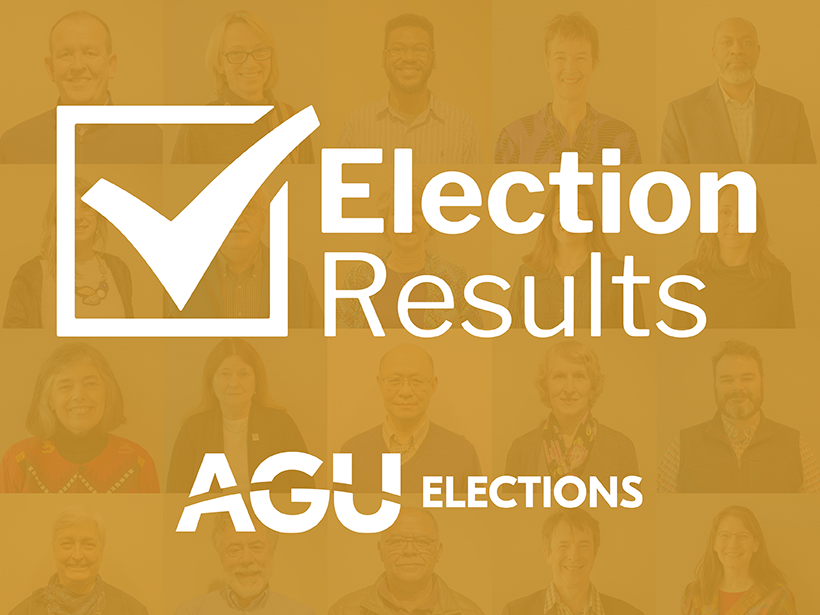In its most recent biennial election, for which voting ended last month, AGU members chose 54 new leaders to serve 2-year terms in 2021–2022. Union officers, Board members, section officers, student and early-career representatives to the Council, and the College of Fellows vice chair were elected. Here the AGU Leadership Development/Governance Committee takes a look back at the voting this year and how 2020 stacked up in comparison to prior elections.
See the accompanying Eos article entitled “Graumlich to Be AGU President-Elect/AGU Leadership Transitions” for election results and an overview of the leadership transition that’s now getting started.
Electronic Voting
Members voted electronically, and access to voting was provided to all eligible voters for a period of 30 days. All members who joined or renewed their membership by 1 September 2020 were eligible to vote in this year’s leadership election.
Survey and Ballot Systems, Inc. (SBS) conducted the voting. SBS, which offers election planning and management services, provided unique login links and other support services for eligible voters throughout the election. SBS sent an initial email to all eligible voters with their ballots on 28 September. The vendor sent four additional reminder emails to eligible voters who had not yet voted during the election. This was one more reminder email than was sent during the last election in 2018. On 30 October, the company certified the results, which were then reviewed by the AGU Leadership Development/Governance Committee.
Participation Rate
Of the voters who provided feedback, more than 90% continue to be satisfied or very satisfied with the voting process.
The total number of ballots validated in the election was 7,095. The number of eligible voters was 38,377, making the participation rate 18.49%. This is slightly lower than in AGU’s last election in 2018, in which the participation rate was 20.09%.
SBS provided all voters the opportunity to rate their satisfaction with the 2020 voting process. In response to this election, 3,412 surveys were received. This is a good indication of voter engagement, and 90.04% of voters continue to be satisfied or very satisfied with the voting process. Voters provided many comments and suggestions, which AGU will analyze and discuss over the coming weeks. Voter feedback is very important, and comments received in 2018 were instrumental in helping the Leadership Development/Governance Committee plan for the 2020 election.
Getting the Word Out
The election was supported by articles in Eos and other communications throughout this year. The Leadership Development/Governance Committee published the proposed slate in Eos on 23 July and the final slate on 4 September.
A special election webpage was created to aid members with the voting process. The election was promoted in the AGUniverse e-newsletter, Eos print ads, Eos Buzz ads, AGU Career Center ads, the AGU.org homepage, AGU Connect, Instagram, LinkedIn, TikTok, Facebook, and Twitter. Section leaders were encouraged to promote voting as well.
Notifications
The Leadership Development/Governance Committee expresses its gratitude to all candidates and to all AGU members who voted.
After reviewing the election report provided by SBS, the committee kicked off the process to notify candidates and announce the results. The process required that all 108 candidates be notified before the election results could be publicly announced. The College of Fellows and each of the 25 sections participating in the 2020 election provided a single point of contact to receive results and contact candidates. Leadership Development/Governance Committee members contacted Board candidates and the student and early-career candidates. Results were released online on 12 November 2020.
The Leadership Development/Governance Committee expresses its gratitude to all candidates and to all AGU members who voted.
—Leadership Development/Governance Committee: Eric Davidson, Chair ([email protected]); Aisling Dolan, Robert A. Duce, Eileen Hofmann, Luis Gonzalez, Peter Griffith, Betty Johnson, Sarah Kruse, Jim Pizzuto, Sabine Stanley, Meng Zhou, Randy Fiser, and Cheryl Enderlein
Citation:
Davidson, E.,Dolan, A.,Duce, R. A.,Hofmann, E.,Gonzalez, L.,Griffith, P.,Johnson, B.,Kruse, S.,Pizzuto, J.,Stanley, S.,Zhou, M.,Fiser, R., and Enderlein, C. (2020), 2020 AGU election statistics, Eos, 101, https://doi.org/10.1029/2020EO151660. Published on 12 November 2020.
Text © 2020. AGU. CC BY-NC-ND 3.0
Except where otherwise noted, images are subject to copyright. Any reuse without express permission from the copyright owner is prohibited.

